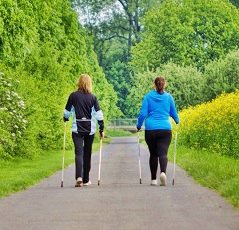Nature benefits your mental and physical health
Getting outdoors makes you happier and healthier
Fact Checked
×All the content published in our website is fact checked to validate its accuracy.
Visit our guidelines web page to learn more about our strict processes regarding how we review our content's sources: reliable and reputable journals, media websites, universities, colleges, organizations, and professionals.
Our articles are based on scientific evidence, and the references are included in its footnotes, which are clickable links to sound scientific papers.
First published: 19. Dec.2020
Overview
Why nature is good for your mental and physical health
Being outdoors and exposed to nature has a positive impact on your mental and physical health and well-being.
This article will review some of the scientific evidence that shows how "Greenspace exposure" or interacting with the great outdoors improves your health.
It will also explore the mechanisms by which green natural environments act upon your mind and body.
Learn the benefits of spending time in nature and why being outside is important.

References and Further Reading
(1) Twohig-Bennett, C., & Jones, A. (2018). The health benefits of the great outdoors: A systematic review and meta-analysis of greenspace exposure and health outcomes. Environmental Research, 166, 628–637. https://doi.org/10.1016/j.envres.2018.06.030
(2) Buckley, R., & Westaway, D. (2020). Mental health rescue effects of women's outdoor tourism: A role in COVID-19 recovery. Annals of tourism research, 85, 103041. https://doi.org/10.1016/j.annals.2020.103041
(3) Kondo MC, Jacoby SF, South EC. (2018). Does spending time outdoors reduce stress? A review of real-time stress response to outdoor environments. Health Place. 2018 May;51:136-150. doi: 10.1016/j.healthplace.2018.03.001. Epub 2018 Mar 29.
(4) Meredith, G. R., Rakow, D. A., Eldermire, E., Madsen, C. G., Shelley, S. P., & Sachs, N. A. (2020). Minimum Time Dose in Nature to Positively Impact the Mental Health of College-Aged Students, and How to Measure It: A Scoping Review. Frontiers in psychology, 10, 2942. https://doi.org/10.3389/fpsyg.2019.02942
(5) Browning, M., Shipley, N., McAnirlin, O., Becker, D., Yu, C. P., Hartig, T., & Dzhambov, A. M. (2020). An Actual Natural Setting Improves Mood Better Than Its Virtual Counterpart: A Meta-Analysis of Experimental Data. Frontiers in psychology, 11, 2200. https://doi.org/10.3389/fpsyg.2020.02200
(6) Hartig T, Mitchell R, de Vries S, Frumkin H. (2014). Nature and health. Annu Rev Public Health. 35:207-28. doi: 10.1146/annurev-publhealth-032013-182443. Epub 2014 Jan 2. PMID: 24387090
(7) Boere K, Lloyd K, Binsted G, Krigolson OE., (2023). Exercising is good for the brain but exercising outside is potentially better. Sci Rep. 2023 Jan 20;13(1):1140. doi: 10.1038/s41598-022-26093-2. PMID: 36670116
About this Article
Being outdoors is good for your Health, A. Whittall
©2024 Fit-and-Well.com, 02 Mar. 2024. Reviewed. 01 Dec. 2024. Update scheduled for 01 Dec.2028. https://www.fit-and-well.com/wellness/being-outdoors-is-good-for-your-health.html



